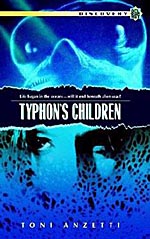
![]() JDowds
JDowds
1/1/2013
![]()
First, a disclaimer. I finished this book while reeling from the after-effects of the whiskey mixed with wine concoction my friends and I put together for New Year's. So yeah, I was hung over. Still am a little, actually. Please don't hold it against me, I'm doing my very best not to let the horse bucking around inside my skull taint my perception of this novel.
To make a long story short, this book was okay. Ann Zeddies (or Toni Anzetti as she calls herself here) managed to create a rich, biologically fascinating aquatic alien world. I rarely come across a world as interesting and diverse as Typhon in my reading. From ketos, to Round People, to Boogers, to the giant leviathans of the Deep, the inhabitants of Typhon are remarkable and very exciting to read about.
The biology of this book is what makes it stand out. The aliens you find here aren't just some cleverly disguised humans. They're alien. Communication via echolocation and scents excreted into the water, memories recorded in the form of underwater dance. Even the plant life briefly seen in the beginning of the book is given its fair shake. According to the back flap, Ms. Zeddies has been interested in biology and aquatic life since age three, and it shows here. The world of Typhon is fully realized and refreshing.
However, I found the story and characters to be lacking. The book begins on the island Refuge, where the survivors of the original Typhon colony have relocated. Some big volcano blew their original colony to smithereens. Lives were lost, families were torn apart, some pets probably drowned, it's all very sad. What's worse, is that the children born on Typhon (referred to as ‘newgens') all have degenerative mutations. One kid's legs are stumps, one guy's face is split open, some girls look like monsters. Then there's Dilani, one of the main characters. Dilani is deaf. That's it. She's not deformed, she's just deaf.
The other main character is named Per. He's a scientist who likes fish and hates authority. Seriously, this dude hates authority. To the point where it's kind of like, "Okay bro, let's talk about something other than your disgust with the current political situation on this tiny island of twenty people." Dilani wants to learn from him, but he doesn't want to have anything to do with her for some reason. It's kind of explained, but left me scratching my head.
Things get interesting when Dilani, Per, and the dude with no legs get trapped on the open sea. The only way they can survive? Follow the octopus that knows sign language! That's all the spoilers I'm willing to put in here, but yeah, there's an octopus that knows sign language. Sort of.
I wasn't a very big fan of Per or Dilani. Per has this shadowy past that makes him a jerk (also, this past is never really dealt with. It just hangs there.), and Dilani is just angry about being deaf and stuff. As fascinating as this book is, those two really fall flat, and since you spend a good amount of time with them underwater and engaged in internal dialogues, they can grate on you.
One theme throughout the book was the idea of DNA manipulation. It's implied that long before the events of the book, humans figured out how to mess with their genetic makeup. So they could turn humans into dragons and shit. Awesome, right? Well, here I was, thinking this was going to be the defining theme of the book (You know, what makes us human, is humanity something in our genes or is it something more, that kind of thing.) when it sort of just goes away.
In its place, a bunch of other themes cropped up. Language, the nature of God, do our handicaps define us, etc. It felt all over the place, drifting as much as the main characters were in the sea.
The biggest problem I had though? The ending. Again, no spoilers, but it felt like things were taken out of the characters hands. They were given the answers to their questions rather than discovering their own. It kind of felt cheap. Plus, the characters didn't feel like they grew. They changed, to be sure, but I don't think they really grew.
I'm still recommending this book. It's not a hard read and the planet is fascinating. There's a sequel, and I think I'll get it. But I'm really only getting it for the sake of the planet Typhon. I'm interested in its past more than I'm interested in its current inhabitants. Check it out if you want a fascinating underwater read.
Now where's the damn aspirin?